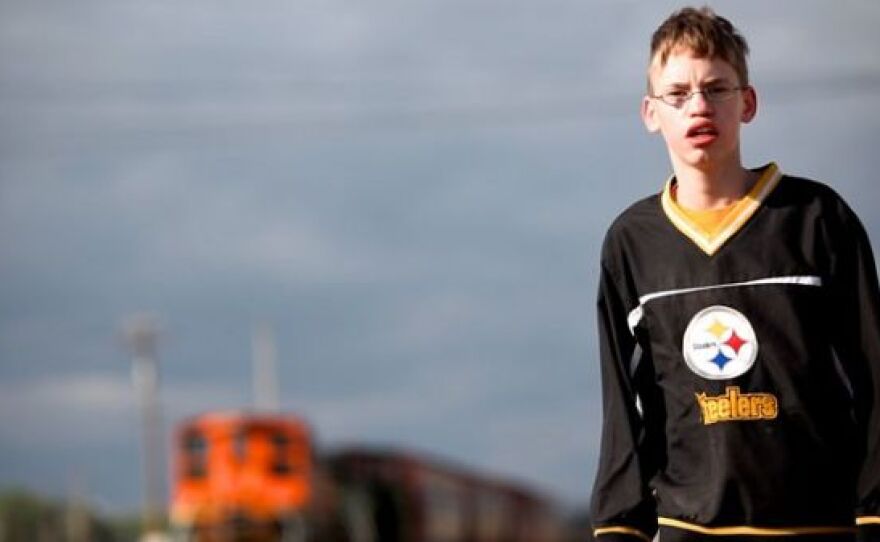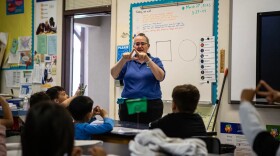"Bully" (now playing at Landmark's Hillcrest and AMC La Jolla 12) is a documentary about the very real problem of bullying among kids. Here's more of my interview with director Lee Hirsch.
Lee Hirsch was bullied as a kid so he knows firsthand what that experience can be like. In his previous documentary, "Amandla! A Revolution in 4 Part Harmony," he explored the role music played in South Africa's anti-apartheid movement. Both films consider what's required to bring someone or a group of people to action.
"Bully" avoids talking heads and instead chooses to focus on a small group of children scattered across the U.S. (although none from big urban cities) and follow them around as they cope with varying degrees and types of bullying. The film starts with parent David Long talking about his son Tyler who, at the age of 17, took his own life after incessant bullying from fellow students. It's an extreme case but one meant to open our eyes to the fact that bullying can is serious problem that should not be dismissed as something kids have to go through, like a rite of passage. David Long sadly proves that some kids don't survive it.
The other students Hirsch focuses on are Alex, 12, gets a lot of physical abuse; Kelby, 16, is harassed for coming out as a lesbian; Ja'Meya, 14, is arrested for pulling out a gun after repeated bullying; and the Smalleys discuss how their son's death led them to activism against bullying.
Hirsch's film calls attention to multiple aspects of the problem: the types of abuse, how parents and schools respond, law enforcement, and how other children respond. There are no easy answers and sometimes the film is painful to watch. It is also surprising to see how oblivious adults can be. A pair of school administrators come off as well intentioned but ineffectual and out of touch. When Alex complains about his abuse and specifically about having his head smashed under a school bus seat, the principal points out that that particular abuse never occurred again. Alex responds that abuse, however, has continued. To which she has no answer. Another administration lectures a bullied kid for not shaking hands with his abuser and criticizes him for being just like the bully. The kid sees the absurdity of that statement but she doesn't. And then a teacher forces kids in class to reveal how many friends they have -- the question was not intended to humiliate those kids without friends but that's precisely what it does and the teacher, like those administrators, seems oblivious to any harm that might be caused.
Even loving parents are seen sometimes making things worse by the particular way they choose to discuss the abuse. But Hirsch shows how difficult it is for parents to deal with bullying because bullied kids can be uncommunicative. As a parent whose son was verbally bullied in elementary school for having a speech impediment, it's easy for me to identify with the parents in the film. There are few things more painful than seeing your child suffer and feeling uncertain of what to do to help or unable to fix the problem. Even when the parents go to the school or authorities, they are often not given answers or actions that satisfy them. The most tragic, though, are the two sets of parents who lost their children.
The one parent and child who stood out in the film are Bobby Johnson and his daughter Kelby. On Midday Edition, Johnson said that he did not raise his daughter to be "a victim." And his message seems to have not only gotten through to her but given her the strength to stand up to her bullies and try to make a difference. When offered a chance to leave the school where even the teachers joined in on the taunting, Kelby initially says no. She says she wants to stay and try and make a difference by standing up for her rights. She is an admirable young girl and you feel confident that she will survive this.
My only real complaint about Hirsch's film is a stylistic choice. He uses a lot of handheld camera with constant rack focusing. This quickly grows annoying and distracting. It's not the result of having to shoot documentary footage in difficult or stressful conditions. It plays as a distinct and stylistic choice. It's too bad that he didn't realize the strength of his material and that he didn't need to try and up the tension or immediacy with a gimmick like this.

Hirsch came to San Diego last October when the film had its local premiere at the San Diego Film Festival. Here is what he had to say.
BETH ACCOMANDO: What made you decide to make this film now?
LEE HIRSCH: The Bully Project was an attempt to reconcile my own past demons and also bring a story forward that really just needed to be told. I wanted to find a way to create a sort of undeniability in a very real and understandable portrait of what bullying looks like, what kids and families go through, and it felt like it was the right time to try and explore that.
BA: Were you ever bullied?
LH: I was bullied as a kid. It was very physical, a lot of punches and kids waiting to come and take their turns hitting me. It went on for a long time and it was really hard to go through. It was hard to go through but also hard to talk about and communicate what was happening and get support from administrators or teachers or even my family on some level to get them to understand so there was always a part of me that wanted to tell the story but also a part of me that understood it was hard to tell the story because it often gets minimized when it's spoken about. It's one of those things where you can speak about it and it's almost automatically brushed off as this is a rite of passage, this is normal, or this will make you stronger. And it was all of that and all of those ideas that were churning around that kind of inspired me to want to do the film. And I felt like it could give voice to millions of kids and adults who deal with this or are still processing it or trying to find a way through it.
BA: Was it difficult to find families willing to participate in the film?
LH: It really wasn't. I was surprised by how many people wanted to talk and share their stories. There wasn't a family that we reached out to or a kid that wasn't like I really want to tell my story. That didn't necessarily mean they were jumping up and down to tell it but it helped for me to be able to say this is something that I've been through. We were fortunate that the kids and the families in the film were partners, they felt like they had really chosen to partake and share their lives and that was an important relationship.
BA: Were there any problems getting some of these kids who were the bullies in the film?
LH: We needed to go back and get a secondary signed release form from the kids who were bullying , and that was like 28 kids. And so our team of incredible producers went back to Sioux City and literally met with every one of those families and had to say will you sign this release even though your kid is wailing on somebody or involved in bullying? And they all agreed and it was extraordinary. Some of the families cried. Some were really upset with their kids, they didn't know their kids had been doing that. Some felt that they needed to know, that they needed to see that, and understand that, and have that be part of their life story too. It was really fascinating in the way in which all of the families chose to participate, even the ones whose kids were engaged in being cruel.
BA: What did you hope the impact of the film could be?
LH: It does what I wanted it to do, it gets people talking. The film has this kind of visceral impact on its audience and whether they are teenagers or adults it causes a strong emotional sense. One of the decisions that we made was that the movie wouldn't have experts and have talking heads, there's no kind of this is the prescription to fix this problem. It's really just you spend the time experiencing what bullying's like. From there it's a much easier connection to have, to make a choice to change one's behavior, to make a choice to look deeper into what's happening with your kids or to talk to a school more seriously or for an administrator to really think how they have been handling it, it's open in a way that lets people come to their own conclusions with the film. And that's a great formula for a film that does want change, that the viewers decide what change can be for themselves. Once you've seen the film then the conversation is really different afterwards.
BA: Is bullying something that could ever be eradicated or is it just too ingrained in our culture?
LH: I think like anything, eradication is a big word. I think we can make a hell of a difference. I think we can make a really big change in a society in terms of how we respond to bullying. How we listen for bullying, how we look for it, How seriously we treat it. And how vigilante we are in dealing with it, and I think that will make a huge difference. The thing about bullying is that you really see it as a building by building problem when you talk about it in the school setting. So you can have two schools, similar populations, similar socio-economic everything but one has a really high rate of bullying and the other has very little, and you have to give credit to those administrators and those schools that say our school culture isn't going to allow for bullying. In our school we want our kids to feel safe. And in us they know they have partners in that wish and that journey. And I think that distinction is really clear and so when we say eradicate bullying, yeah great that would be awesome, but in the meantime let's get each community to ask those questions about their schools and what's the culture and the climate here? How do these cases get responded to ? How are the parents spoken to when they say this has happened to my kid and I'm really worried. Is it being brushed off? Is it taken seriously? That's the way we really begin to cause change. When we say we don't evaluate our schools just on their math and science scores but on their culture scores, on how safe kids feel because if they don't feel safe in schools they don't learn. The other exciting space that I love to see this happening with the film is that people come out of the movie theater and they have made a personal choice that I'm not gonna be a bystander. I'm not gonna stand by and be silent while someone is bullied. It's not okay and they are willing to stand up and intervene -- that's a radical change right there. And that's something that we think can happen. That's exciting. That's why I think "An Inconvenient Truth" worked; people came out of that movie theater and they said maybe I should buy a car that
BA: Do you see any connection between "Bully" and "Amandla"?
LH: If we can understand that spark, what will move someone off the sidelines to make a choice, to say that means I'm gonna go and I'm gonna stand up for someone and if they start making those choices at 9, 10, 11, 12, 13, then that's maybe a lifetime of making those choices and that's really exciting. So that territory is really rich for me. And it's a great fusion of my love of filmmaking and my love of activism.
Check for "Bully" showtimes here.






